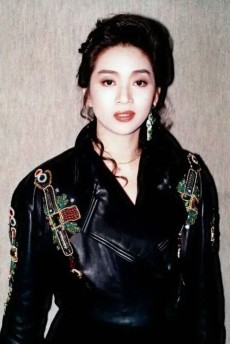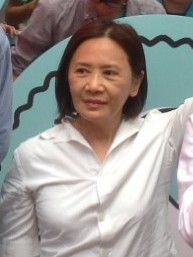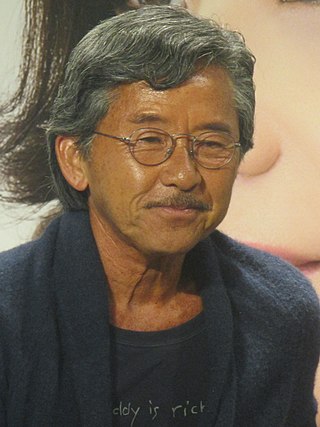Cantopop is a genre of pop music sung in Cantonese. Cantopop is also used to refer to the cultural context of its production and consumption. The genre began in the 1970s and became associated with Hong Kong popular music from the middle of the decade. Cantopop then reached its height of popularity in the 1980s and 1990s before slowly declining in the 2000s and shrinking in the 2010s. The term "Cantopop" itself was coined in 1978 after "Cantorock", a term first used in 1974. In the 1980s, Cantopop reached its highest glory with fanbase and concerts all over the world, especially in Macau, Mainland China, Taiwan, Singapore, Malaysia, South Korea, and Japan. This was even more obvious with the influx of songs from Hong Kong movies during the time.

Anita Mui Yim-fong was a Hong Kong singer and actress who made major contributions to the Cantopop music scene and received numerous awards and honours. She remained an idol throughout her career, and is regarded as a Cantopop diva. She was dubbed as the "daughter of Hong Kong" and is considered one of the most iconic Cantopop singers.

Joseph Koo Kar-Fai was a Hong Kong composer. He used the pen name Moran (莫然) for Mandarin songs early in his career. According to the Hong Kong Academy for Performing Arts, Koo was one of the most respected composers in Hong Kong.

Priscilla Chan Wai Han is a Hong Kong singer. She is renowned for her contralto singing voice and her maturely clear, technically skilled, and emotion-rich vocals.

Joey Yung is a Hong Kong singer signed to Emperor Entertainment Group. Since her debut in 1996, Yung has won numerous awards, including the JSG Most Popular Female Singer and Ultimate Best Female Singer – Gold awards a record-breaking nine times. She was ranked 63rd on the 2014 Forbes China Celebrity 100, making her the most influential Hong Kong–based female singer that year. In 2014, she reportedly earned HK$80 million (US$10.3 million).

Stephanie Cheng is a Hong Kong cantopop singer. She debuted under Go East Entertainment with the song "Grown Up" in 2003 and has since released more than six albums and EPs. She is best known for her song "Traffic Light" 紅綠燈 released in 2006; the song topped all four major radio stations in Hong Kong and garnered many year-end chart awards.

Danny Chan Pak-Keung was a Hong Kong singer, songwriter and actor. One of the first Cantopop idols in Hong Kong, he gained fame alongside performers Alan Tam, Anita Mui, and Leslie Cheung, who were collectively known as "Three Kings and a Queen" (三王一后) or "Tam Cheung Mui Chan" (譚張梅陳) in the 1980s. He is best remembered for such songs as "Waiting", "Life Expectation", "Ripples", "Loving You Alone" and "Cherish Tonight".

James Wong Jim was a Cantopop lyricist and songwriter based primarily in Hong Kong. Beginning from the 1960s, he was the lyricist for over 2,000 songs, collaborating with songwriter Joseph Koo on many popular television theme songs, many of which have become classics of the genre. His work propelled Cantopop to unprecedented popularity.

The Music of Hong Kong is an eclectic mixture of traditional and popular genres. Cantopop is one of the more prominent genres of music produced in Hong Kong. The Hong Kong Philharmonic Orchestra and the Hong Kong Sinfonietta regularly perform western classical music in the city. There is also a long tradition of Cantonese opera within Hong Kong.

Deanie Ip is a Hong Kong singer and actress. She has won the Hong Kong Film Awards once for Best Actress and three times for Best Supporting Actress. Deanie also won the Golden Horse Awards once for Best Leading Actress and twice for Best Supporting Actress; she also won a Coppa Volpi for the Best Actress at the 68th Venice International Film Festival. Her Cantopop albums were released by Universal Music Group and several local labels. A Hakka of Huiyang ancestry, she speaks Cantonese, Dapeng dialect, Mandarin and English.

Ye is a Chinese-language surname. It is listed 257th in the Song dynasty classic text Hundred Family Surnames, and is the 43rd most common surname in China, with a population of 5.8 million as of 2008 and 2019.

George Lam Tsz Cheung, also known professionally by his surname Lam, is a Hong Kong-based veteran Cantopop singer, singer-songwriter, music producer and actor, with a career that spanning more than four decades. Self-producing, Lam creates most of his own albums and songs, as well as being especially involved with creative direction of his work outside its musical aspects. Lam has a wide vocal range and has interpreted and performed in many different genres of music.

Sandy Lam Yik-lin, is a Hong Kong singer, actress and producer. She rose to fame in the 1980s, before expanding her fan base significantly in Asia, releasing more than 30 stylistically diverse albums in Cantonese, Mandarin, English and Japanese.
Teresa Carpio is a Hong Kong English- and Cantonese-language pop singer, actress, and singing teacher. Carpio was popular in Hong Kong during the 1970s and 1980s. She is the paternal cousin of actress and singer Rita Carpio, and also the mother of actress and singer T.V. Carpio. She is most well known for her Cantonese-language hits, 假如 (If), 仍然記得嗰一次, 眉頭不再猛皺 (Sukiyaki), 何必放棄 and 真愛.

Corinna Kathy Chamberlain Cheng is a New Zealand-Hong Kong singer and actress. She is also a musical theatre performer, model, and occasional television host for TVB. She was a director for the dance company, "Morethandance" until December 2008.
Virginia Yip (葉彩燕), is a Hong Kong linguist and writer. She is director of the Childhood Bilingualism Research Centre. She is a professor at the Chinese University of Hong Kong. Her research interests include bilingual language acquisition, second language acquisition, Cantonese, Chaozhou and comparative Sinitic grammar, psycholinguistics, and cognitive science.

Connie Mak Kit-man, also called Connie Mak and Kitman Mak, is a Hong Kong singer and actress. Her ancestral hometown is Qingyuan, Guangdong.
"Bu liao qing" is a Mandarin song variously translated into English as "Love Without End", "Endless Love", or "Unforgettable Love". The song was released in 1961, The music was composed by Wong Fuk Ling (王福齡), and the lyrics were written by Tao Tseon (陶秦). The song was first sung by Koo Mei (顧媚), sister of Joseph Koo, in the 1961 Shaw Brothers film of the same name (不了情). This song has been sung by various singers in later years, such as Sally Yeh, Anita Mui, Tsai Chin and Frances Yip.

Samantha Lam Chi-mei is a Hong Kong singer and songwriter. In 1982, the television station RTHK awarded one of her songs, "Feelings of a Passage" (感情的段落), later heard from her 1983 self-titled debut album, as one of top ten gold songs of 1981–82. In 1983, Lam sang a radio hit Cantonese rendition of the well-known Mandarin song "Into Your Eyes" (你的眼神), originally sung in 1981 by Tsai Chin, for her debut album. In 1984–85, another of her songs, "ngau yu" (偶遇), a theme song for the 1984 film A Certain Romance (少女日記), was awarded as one of top ten gold songs of 1983–84 by RTHK, the seventh place of the Jade Solid Gold Best Ten Music Awards by another station TVB, and the Hong Kong Film Award for the Best Movie Song (最佳電影歌曲) of 1984. Lam sang also "ouyu" (偶遇), a Mandarin version of "ngau yu", for the titled 1984 album. Since then, later singers have rendered both versions of "ngau yu", like Sammi Cheng and Zhou Xun.
Joyce Lee Lok-sze is a Hong Kong Canadian singer and songwriter best known for her Cantopop songs including "Beloved", “Love Your Life Without Regrets" in the Hong Kong drama A Kindred Spirit, and her performance of the Chinese national anthem at Canada Day in Hong Kong.
















